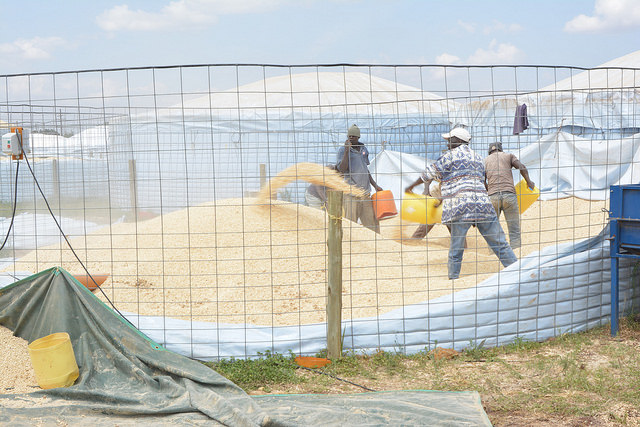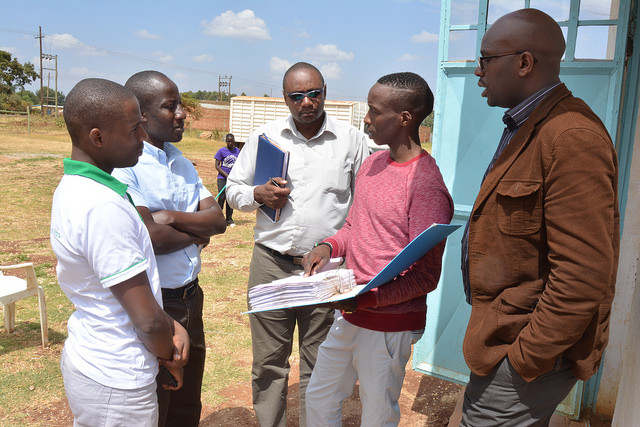Sep 16, 2018 | by Elizabeth Adams, Global Communities

About the Partnership: In Kenya, maize markets are fragmented and volatile, especially for vulnerable smallholder farmers. Many farmers continue to trade directly with unscrupulous middlemen. Partnering with major commodity buyers is a win-win strategy to empower smallholder farmers to drive inclusive trade and economic development. Global Communities has one such exciting partnership with Cargill in Kenya. Since November 2017, we have been working with Cargill to provide a stable, reliable market for 150 maize producer organizations (POs) in Nakuru, Trans Nzoia and Uasin Gishu counties in the Rift Valley region of Kenya. These POs are relatively small, ranging between 25 and 30 members, disorganized, and their profitability, operational and leadership capabilities vary widely. Most are registered as Self Help Groups, not commercial cooperatives. In return, Cargill secures reliable suppliers to acquire sufficient quantities and quality of maize.
The partnership is supported by the U.S. Department of Agriculture (USDA), which has funded Global Communities’ Agribusiness Investments for Market Stimulation (AIMS) program since its inception in 2014. Cargill, a major commodity trader, purchases several thousand tons of grains in Kenya per year.
Overcoming Market Obstacles Together: In the past, Cargill has struggled to source sufficient volumes of maize in Kenya to meet commercial demand. Cargill usually sources maize directly from traders who buy from farmers. They find that the quality poor and end up rejecting whole consignments. Likewise, smallholder maize farmers struggle to find markets that are reliable and can pay a good price within a reasonable time frame. With this challenge in mind, Global Communities and Cargill partnered to identify and link Cargill to suitable POs that can supply good quality – and sufficient quantities – of grain.
In the 2017/2018 harvest season (Dec. 2017-Feb. 2018), the partnership facilitated the sale of 6,200 bags (90 kg) of maize to Cargill. This volume came from just nine POs that were ready to sell at that time. Preparations are already underway to expand this group up to 150 groups for next harvest season, which begins in October 2018.
In an effort to scale up the volume, Global Communities has identified and profiled a total of 143 POs based on their production capacity and potential to be a reliable supplier. During the profiling process, we also identified specific capacity building needs. Global Communities then hosted a series of engagement meetings to introduce the POs to Cargill. For most groups, this was their first time to meet and learn about Cargill. The forums were designed to share Cargill’s procurement requirements, buying processes, and unique 48-hour payment method. This is particularly attractive to farmers as most buyers take 90 or more days to make payments.
This facilitated engagement with Cargill is a key step in developing these market linkages. Farmers get to interact directly and understand Cargill’s standards and buying processes. Cargill’s participation at the engagement forums led to higher credibility, trust and ultimately to higher sales.

An employee of Cargill taking AIMS' staff through their recent records for maize suppliers in Nakuru County
Building Capacity & Trust Simultaneously: To build the capacity of POs to work together and to overcome key market obstacles including access to finance, Global Communities provided targeted trainings to the farmer groups led by private Business Advisory Service Providers (BASPs). BASPs are a key part of the AIMS strategy of strengthening the entire agricultural market system. AIMS has requalified 43 BASPs to provide essential business services – such as business planning, financial management, and aggregation – to a range of agricultural SMEs at an affordable price. “These trainings are an eye-opener to us, especially on cash flow management. We have been losing a lot of resources due to ignorance and issues that we have been considering non-consequential,” says Samuel Njoroge, Coordinator CHICOFAR CBO, a farmer group in Nakuru County that was linked to Cargill earlier this year.
As with any new business relationship, earning trust is a slow process. Many farmer groups decided to start by selling relatively smaller quantities to Cargill, to test if its payment system functioned and if they really were reliable and trustworthy. After this first experience, many groups have seen that Cargill is a good faith partner, and plan to sell more volume next season. Barnabas Kirwa, chairman of Moiben Farmers Marketing Federation in Uasin-Gishu County, was initially reluctant. “If at all we would foretell the future of maize market this year, we would have engaged with Cargill from the onset of our introduction by Global Communities,” he said. “We would not be suffering losses experienced today. We shall plan accordingly for the coming season to supply to Cargill.”
Lessons Learned: We have learned that establishing good payment terms is the key step, but often more is needed to work with POs. Cargill is considering providing transport to groups that are able to aggregate sufficient quantities. This could be a big incentive to POs that struggle with the high cost of transport and loss of grain in transit. Access to data is also an issue. Although Cargill posts prices at their grain depots, this information does not always get to farmers, especially those who live far from the depots. Cargill is looking into how to disseminate price information daily via the cellular phone system.
Through this partnership with Cargill, we have learned that the capacity and cohesion of the selected POs was not as high or as strong as expected. This came as a surprise since many had received considerable support from previous donor programs. Even when groups that had a dedicated aggregation center, members still sold individually as they did not trust the group leadership to manage their commodity. These groups still need much help in establishing strong governance structures, rules and relationships that inspire confidence among members to aggregate their commodities.
We are encouraged and inspired by what we’ve seen so far in this partnership and are ready for a very productive and profitable maize harvest in 2018!
Ms. Elizabeth Adams is an international development specialist with over fourteen years of professional and academic experience working with a variety of agricultural and food security programs in Africa, Asia and Latin America & Caribbean. She is is currently a Technical Director at Global Communities focusing on supporting and expanding agriculture, food security, and gender programming in the developing world. Her focus on inclusive, pro-poor rural development emphasizes linking producers to profitable domestic and export markets in an economically and environmentally sustainable way. Specifically, she has extensive technical knowledge of and experience with the approaches for reaching and training smallholder farmers, tools and techniques for inclusion of women and girls, nutrition-sensitive and climate-smart strategies, global cocoa and coffee value chains, and processes for results-oriented and adaptive management. Ms. Adams has an M.A. in International Development Studies from The George Washington University’s Elliott School of International Affairs and speaks fluent Spanish.
Categories: Food Security Market Systems Blog Agriculture & Food Security Blog WebinarsBlogs

1621 North Kent Street, Ste 900,
Arlington, VA, 22209
P 202.534.1400
F 703.276.1433
Website Photos: © mari matsuri
